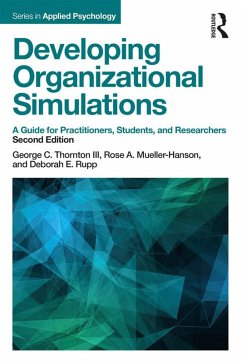George C. Thornton III, Rose A. Mueller-Hanson, Deborah E. Rupp
Developing Organizational Simulations (eBook, PDF)
A Guide for Practitioners, Students, and Researchers
44,95 €
44,95 €
inkl. MwSt.
Sofort per Download lieferbar

22 °P sammeln
44,95 €
Als Download kaufen

44,95 €
inkl. MwSt.
Sofort per Download lieferbar

22 °P sammeln
Jetzt verschenken
Alle Infos zum eBook verschenken
44,95 €
inkl. MwSt.
Sofort per Download lieferbar
Alle Infos zum eBook verschenken

22 °P sammeln
George C. Thornton III, Rose A. Mueller-Hanson, Deborah E. Rupp
Developing Organizational Simulations (eBook, PDF)
A Guide for Practitioners, Students, and Researchers
- Format: PDF
- Merkliste
- Auf die Merkliste
- Bewerten Bewerten
- Teilen
- Produkt teilen
- Produkterinnerung
- Produkterinnerung

Bitte loggen Sie sich zunächst in Ihr Kundenkonto ein oder registrieren Sie sich bei
bücher.de, um das eBook-Abo tolino select nutzen zu können.
Hier können Sie sich einloggen
Hier können Sie sich einloggen
Sie sind bereits eingeloggt. Klicken Sie auf 2. tolino select Abo, um fortzufahren.

Bitte loggen Sie sich zunächst in Ihr Kundenkonto ein oder registrieren Sie sich bei bücher.de, um das eBook-Abo tolino select nutzen zu können.
This book provides a concise source of information on effective and practical methods for constructing simulation exercises for the assessment of psychological characteristics relevant to effectiveness in work organizations.
- Geräte: PC
- mit Kopierschutz
- eBook Hilfe
- Größe: 2.57MB
Andere Kunden interessierten sich auch für
![Becoming an Industrial-Organizational Psychologist (eBook, PDF) Becoming an Industrial-Organizational Psychologist (eBook, PDF)]() Dennis DoverspikeBecoming an Industrial-Organizational Psychologist (eBook, PDF)30,95 €
Dennis DoverspikeBecoming an Industrial-Organizational Psychologist (eBook, PDF)30,95 €![Work and Organizational Psychology (eBook, PDF) Work and Organizational Psychology (eBook, PDF)]() Sebastiaan RothmannWork and Organizational Psychology (eBook, PDF)48,95 €
Sebastiaan RothmannWork and Organizational Psychology (eBook, PDF)48,95 €![Organizational Change (eBook, PDF) Organizational Change (eBook, PDF)]() Organizational Change (eBook, PDF)44,95 €
Organizational Change (eBook, PDF)44,95 €![Handbook of Organizational Justice (eBook, PDF) Handbook of Organizational Justice (eBook, PDF)]() Handbook of Organizational Justice (eBook, PDF)56,95 €
Handbook of Organizational Justice (eBook, PDF)56,95 €![Work Motivation in Organizational Behavior (eBook, PDF) Work Motivation in Organizational Behavior (eBook, PDF)]() Craig C. PinderWork Motivation in Organizational Behavior (eBook, PDF)44,95 €
Craig C. PinderWork Motivation in Organizational Behavior (eBook, PDF)44,95 €![New Directions in Organizational Psychology and Behavioral Medicine (eBook, PDF) New Directions in Organizational Psychology and Behavioral Medicine (eBook, PDF)]() Cary CooperNew Directions in Organizational Psychology and Behavioral Medicine (eBook, PDF)41,95 €
Cary CooperNew Directions in Organizational Psychology and Behavioral Medicine (eBook, PDF)41,95 €![Organizational Interventions for Health and Well-being (eBook, PDF) Organizational Interventions for Health and Well-being (eBook, PDF)]() Organizational Interventions for Health and Well-being (eBook, PDF)44,95 €
Organizational Interventions for Health and Well-being (eBook, PDF)44,95 €-
-
-
This book provides a concise source of information on effective and practical methods for constructing simulation exercises for the assessment of psychological characteristics relevant to effectiveness in work organizations.
Dieser Download kann aus rechtlichen Gründen nur mit Rechnungsadresse in A, B, BG, CY, CZ, D, DK, EW, E, FIN, F, GR, HR, H, IRL, I, LT, L, LR, M, NL, PL, P, R, S, SLO, SK ausgeliefert werden.
Produktdetails
- Produktdetails
- Verlag: Taylor & Francis eBooks
- Seitenzahl: 254
- Erscheinungstermin: 27. März 2017
- Englisch
- ISBN-13: 9781317312918
- Artikelnr.: 48114446
- Verlag: Taylor & Francis eBooks
- Seitenzahl: 254
- Erscheinungstermin: 27. März 2017
- Englisch
- ISBN-13: 9781317312918
- Artikelnr.: 48114446
- Herstellerkennzeichnung Die Herstellerinformationen sind derzeit nicht verfügbar.
George C. Thornton III is Professor Emeritus of Psychology at Colorado State University, USA. He specializes in assessment centers and implications of employment discrimination law for personnel psychology. He is the lead author of Assessment Center Perspectives for Talent Management Strategies.
Rose A. Mueller-Hanson is Associate Director/CFO at Community Interface Services, USA. She specializes in developing and implementing talent management programs and has published numerous articles and given presentations on a variety of talent management topics.
Deborah E. Rupp is Professor and William C. Byham Chair in Industrial-Organizational Psychology at Purdue University, USA. She specializes in the psychometric, technological, cross-cultural, legal, and ethical issues inherent in workplace behavioral assessment. She also consults and conducts research in the areas of organizational justice/ethics, corporate social responsibility, and humanitarian work psychology.
Rose A. Mueller-Hanson is Associate Director/CFO at Community Interface Services, USA. She specializes in developing and implementing talent management programs and has published numerous articles and given presentations on a variety of talent management topics.
Deborah E. Rupp is Professor and William C. Byham Chair in Industrial-Organizational Psychology at Purdue University, USA. She specializes in the psychometric, technological, cross-cultural, legal, and ethical issues inherent in workplace behavioral assessment. She also consults and conducts research in the areas of organizational justice/ethics, corporate social responsibility, and humanitarian work psychology.
Part I: Concepts and Principles 1. Simulations in Context 2. Developing
Simulations Step by Step 3. Theories, Principles, and Conceptual Frameworks
Relevant for Constructing Simulations 4. General Issues and Specific Tips
for Constructing Simulations 5. Technology and Simulations Part II:
Categories and Types of Simulations 6. Individual Interpersonal Simulations
7. Individual Information Simulations 8. Intra-Group Simulations 9.
Inter-Group Simulations 10. Simulations Involving Physical Activities 11.
Low-Fidelity Simulations 12. Integrated Simulations: A "Day-in-the-Life"
Part III: Implementation and Evaluation 13. Choosing and Training
Assessors, Role Players, Administrators, Feedback Providers/Coaches, and
Technical Support Persons 14. Demonstrating the Value of Simulations 15.
Ensuring Simulations are Compliant with Statutes, Regulations, Standards,
and Guidelines 16. Summary and Conclusions Regarding Organizational
Simulations
Simulations Step by Step 3. Theories, Principles, and Conceptual Frameworks
Relevant for Constructing Simulations 4. General Issues and Specific Tips
for Constructing Simulations 5. Technology and Simulations Part II:
Categories and Types of Simulations 6. Individual Interpersonal Simulations
7. Individual Information Simulations 8. Intra-Group Simulations 9.
Inter-Group Simulations 10. Simulations Involving Physical Activities 11.
Low-Fidelity Simulations 12. Integrated Simulations: A "Day-in-the-Life"
Part III: Implementation and Evaluation 13. Choosing and Training
Assessors, Role Players, Administrators, Feedback Providers/Coaches, and
Technical Support Persons 14. Demonstrating the Value of Simulations 15.
Ensuring Simulations are Compliant with Statutes, Regulations, Standards,
and Guidelines 16. Summary and Conclusions Regarding Organizational
Simulations
Part I: Concepts and Principles 1. Simulations in Context 2. Developing
Simulations Step by Step 3. Theories, Principles, and Conceptual Frameworks
Relevant for Constructing Simulations 4. General Issues and Specific Tips
for Constructing Simulations 5. Technology and Simulations Part II:
Categories and Types of Simulations 6. Individual Interpersonal Simulations
7. Individual Information Simulations 8. Intra-Group Simulations 9.
Inter-Group Simulations 10. Simulations Involving Physical Activities 11.
Low-Fidelity Simulations 12. Integrated Simulations: A "Day-in-the-Life"
Part III: Implementation and Evaluation 13. Choosing and Training
Assessors, Role Players, Administrators, Feedback Providers/Coaches, and
Technical Support Persons 14. Demonstrating the Value of Simulations 15.
Ensuring Simulations are Compliant with Statutes, Regulations, Standards,
and Guidelines 16. Summary and Conclusions Regarding Organizational
Simulations
Simulations Step by Step 3. Theories, Principles, and Conceptual Frameworks
Relevant for Constructing Simulations 4. General Issues and Specific Tips
for Constructing Simulations 5. Technology and Simulations Part II:
Categories and Types of Simulations 6. Individual Interpersonal Simulations
7. Individual Information Simulations 8. Intra-Group Simulations 9.
Inter-Group Simulations 10. Simulations Involving Physical Activities 11.
Low-Fidelity Simulations 12. Integrated Simulations: A "Day-in-the-Life"
Part III: Implementation and Evaluation 13. Choosing and Training
Assessors, Role Players, Administrators, Feedback Providers/Coaches, and
Technical Support Persons 14. Demonstrating the Value of Simulations 15.
Ensuring Simulations are Compliant with Statutes, Regulations, Standards,
and Guidelines 16. Summary and Conclusions Regarding Organizational
Simulations







